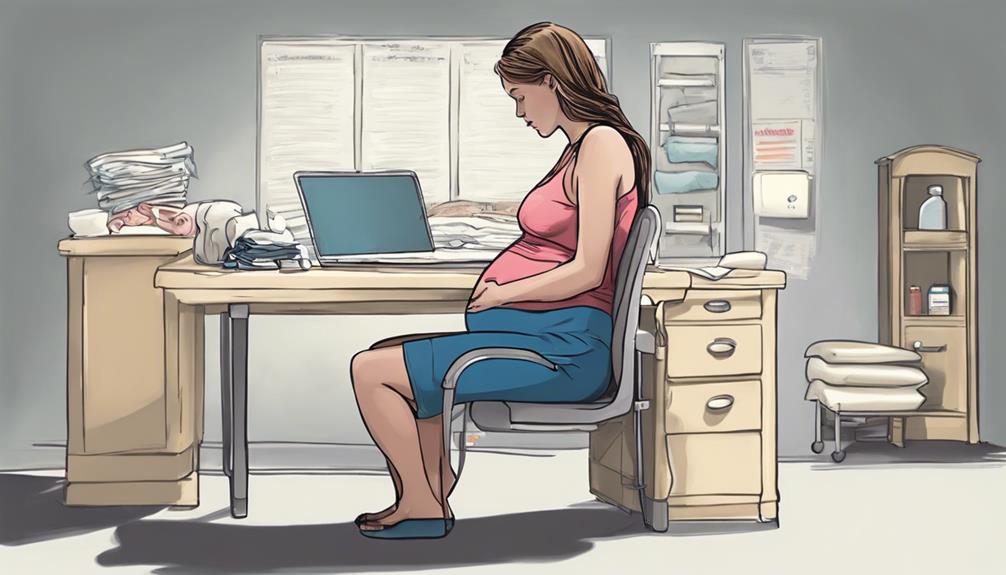As we approach the home stretch of pregnancy, handling urinary incontinence can seem as precarious as keeping a fragile glass of water steady on an unstable table. The last trimester introduces its unique difficulties, but worry not, there are solutions available to address this problem directly.
From simple lifestyle adjustments to targeted exercises, we're here to guide you through ten practical strategies that can make a real difference in your daily comfort and confidence.
So, let's explore these effective methods together and embrace this journey with ease and grace.
Key Takeaways
- Perform pelvic floor exercises to strengthen muscles and reduce leakage risk.
- Stay hydrated to support bladder function and overall health.
- Avoid trigger foods and drinks that worsen bladder control.
- Establish a consistent bathroom routine and consider supportive belly bands for added support.

Kegel Exerciser, Pelvic Floor Muscle Exercise Devices for Women, Inner Thigh Exerciser Leg Workout Equipment Thigh Trainer for Male Hip Trimmer Inner Thigh Toner Workout (Pink)
【16KG Dual-Action Toning – No Band】This versatile thigh workout equipment and leg workout equipment features a 16KG/35LB resistance…
As an affiliate, we earn on qualifying purchases.
As an affiliate, we earn on qualifying purchases.
Pelvic Floor Exercises
When preparing for managing urine leakage during the third trimester of pregnancy, engaging in pelvic floor exercises, such as Kegels, can greatly strengthen the muscles supporting the bladder and help minimize involuntary leaks. These exercises specifically target the pelvic floor muscles, which play a vital role in bladder control. By contracting and relaxing these muscles regularly, you can enhance muscle tone and improve your ability to manage urinary pressure, especially as your baby grows and puts more strain on your bladder.
Pregnancy can sometimes lead to incontinence issues due to the increased pressure on the bladder, but pelvic floor exercises offer a safe and effective way to address these concerns. Strengthening your pelvic floor muscles through exercises not only supports the bladder but also reduces the likelihood of leakage during the later stages of pregnancy. Consistent practice of Kegels can make a significant difference in maintaining urinary control and preparing your body for the upcoming labor while fostering better bladder health.

ChongErfei Maternity Belt, Pregnancy 3 in 1 Support Belt for Back/Pelvic/Hip Pain, Maternity Band Belly Support for Pregnancy Belly Support Band (L: Fit Ab 39.5"-51.3", Black)
✅RECOMMENDED BY OBSTETRICIANS: Medical studies show wearing a high quality maternity support belt, helps to promote a healthier…
As an affiliate, we earn on qualifying purchases.
As an affiliate, we earn on qualifying purchases.
Stay Hydrated

Ensuring adequate hydration is important during the third trimester of pregnancy. We must drink enough water and monitor our fluid intake to support bladder function and overall health.
Let's focus on maintaining proper hydration levels to help manage urine leakage effectively.
Drink Enough Water
Staying properly hydrated by drinking enough water is important for managing urine leakage and promoting overall bladder health during the third trimester of pregnancy. Adequate hydration plays a vital role in preventing urinary tract infections (UTIs) and maintaining proper bladder function.
By keeping hydration levels up, the concentration of urine decreases, reducing the risk of bladder irritation and potential leakage issues. Drinking water regularly not only supports bladder health but also aids digestion, maintains amniotic fluid levels, and fosters optimal fetal development.
Proper hydration is vital for regulating body temperature, preventing constipation, and minimizing dehydration complications that could worsen urinary incontinence problems. Remember, staying hydrated is key to a healthy pregnancy and can positively impact both you and your baby's well-being.
Monitor Fluid Intake
Maintaining proper hydration levels is essential for managing urine leakage and promoting bladder health during the third trimester of pregnancy. Monitoring fluid intake is vital to prevent bladder irritations, incontinence, and other discomforts associated with pregnancy. Adequate hydration not only supports overall fetal development by helping maintain healthy amniotic fluid levels but also aids in reducing the frequency of urinary leakage episodes.

Poise Incontinence & Postpartum Pads for Bladder Leaks, 4 Drop Moderate Absorbency, Regular Length, 20 Count, Packaging May Vary
POISE INCONTINENCE PADS: 20 incontinence and postpartum bladder leak pads, 4 Drop Moderate Absorbency, regular length (20 pads…
As an affiliate, we earn on qualifying purchases.
As an affiliate, we earn on qualifying purchases.
Wear Absorbent Underwear
To effectively manage urine leakage during the third trimester of pregnancy, contemplate wearing absorbent underwear for added protection and peace of mind. Here are some key points to contemplate when using absorbent underwear:
- Various Options: Absorbent underwear comes in different varieties such as disposable pads or leak-proof panties, offering choices to suit individual needs and preferences.
- Enhanced Comfort: These specialized undergarments are designed to absorb urine efficiently, providing comfort and minimizing the discomfort associated with bladder leaks.
- Hygiene Maintenance: By using absorbent underwear, pregnant individuals can maintain hygiene and cleanliness, especially during activities that may trigger urine leakage in the later stages of pregnancy.
- Confidence Boost: Wearing absorbent underwear can help individuals feel more confident and secure as they go about their daily routines without the fear of embarrassing leakage incidents.

BellyBottle Pregnancy Water Bottle Tracker Must Haves for Expecting Moms Nausea Relief + Straw + BPA Free Green
PREGNANCY GIFTS – Voted top 5 gifts for pregnant women.
As an affiliate, we earn on qualifying purchases.
As an affiliate, we earn on qualifying purchases.
Avoid Trigger Foods and Drinks

During the third trimester of pregnancy, making conscious choices to avoid certain trigger foods and drinks can greatly aid in reducing bladder irritation and potential urine leakage.
Foods and beverages like caffeine, alcohol, spicy foods, coffee, and carbonated drinks can exacerbate bladder control issues as your pregnancy progresses. These items act as diuretics, increasing urine production and putting more pressure on your bladder.
Spicy foods and acidic drinks, such as citrus juices, may also irritate the bladder, leading to more frequent urges to urinate and potential leakages.
By consuming a diet low in bladder irritants, you can support better bladder control and minimize the risk of urine leakage during this critical phase.
Being mindful of what you eat and drink, especially in the evenings, can play a significant role in managing urine leakage and promoting comfort as your baby continues to grow.
Schedule Regular Bathroom Breaks

As we navigate the challenges of urine leakage during pregnancy's third trimester, setting regular bathroom breaks becomes essential. Timing these breaks strategically and using reminders efficiently can help us stay on top of our bladder health.
Establishing a routine for bathroom visits is a proactive step towards managing leaks and maintaining comfort during this stage of pregnancy.
Timing Bathroom Breaks
Ensuring regular bathroom breaks every 2-3 hours throughout the day is essential for managing urine leakage and promoting bladder health during the third trimester of pregnancy. Here are some tips for timing bathroom breaks effectively:
- Empty the bladder regularly: Avoid holding urine for too long to reduce accidental leaks.
- Establish a consistent bathroom routine: Plan trips ahead of activities to maintain control and minimize leakage.
- Monitor fluid intake: Keep track of fluids to adjust bathroom schedules and manage leakage effectively.
- Prioritize nighttime routine: Plan bathroom breaks before bed to promote better sleep and manage nighttime incontinence.
Setting Reminders Efficiently
To help manage urine leakage effectively during pregnancy's third trimester, consider setting reminders efficiently to schedule regular bathroom breaks. Setting reminders on your phone or using a timer can assist in staying consistent with your bathroom schedule, reducing the risk of accidents and alleviating the pressure on your bladder.
By scheduling bathroom breaks every 2-3 hours, you can train your bladder and pelvic floor muscles for better control over urine leakage. Consistent bathroom breaks not only help in managing urine leakage but also contribute to improved comfort, confidence, and overall well-being during this stage of pregnancy.
Taking proactive steps to manage bathroom visits efficiently can make a significant difference in how you feel and navigate the challenges of the third trimester.
Maintain a Healthy Weight

Maintaining a healthy weight in the third trimester is essential for reducing bladder pressure and minimizing the risk of urine leakage. Here are some tips to help you manage your weight effectively during this significant stage of pregnancy:
- Balanced Diet: Focus on consuming nutrient-dense foods that support your health and the development of your baby while managing your weight appropriately.
- Regular Exercise: Engage in gentle physical activity approved by your healthcare provider to support your overall well-being and weight management goals.
- Stay Hydrated: Drink plenty of water to maintain hydration levels, support healthy digestion, and assist in weight management.
- Consult Professionals: Seek personalized guidance from your healthcare team or a nutritionist to develop a tailored plan that suits your needs and promotes a healthy weight during late pregnancy.
Practice Good Posture

Let's focus on correcting our sitting positions and adopting standing posture tips to alleviate pressure on our bladder and pelvic floor muscles. By maintaining proper alignment, we can support the weight of our growing belly and reduce strain on the bladder, minimizing the risk of urine leakage.
Avoiding slouching and arching our back won't only enhance bladder control but also contribute to a more comfortable third trimester experience.
Correct Sitting Positions
Ensuring proper posture while sitting is essential for minimizing urine leakage and supporting our bodies during the third trimester of pregnancy.
- Maintain Neutral Pelvic Position: Sit upright with shoulders back and pelvis in a neutral position to reduce pressure on the bladder and pelvic floor muscles.
- Avoid Slouching and Leg Crossing: Prevent stress on the bladder by refraining from slouching or crossing legs, which helps in maintaining proper spine and pelvic alignment.
- Choose a Supportive Chair: Opt for a chair with proper lumbar support to alleviate strain on the pelvic floor muscles during the third trimester.
- Practice Mindful Sitting: Engage in mindful sitting positions to enhance overall comfort and potentially manage urine leakage issues effectively as pregnancy progresses.
Standing Posture Tips
As we move from discussing correct sitting positions to standing posture tips during pregnancy's third trimester, it's crucial to focus on maintaining a balanced and aligned stance to support the bladder and pelvic floor muscles effectively.
Practicing good posture while standing can greatly reduce pressure on the bladder and pelvic floor, helping to minimize the risk of urine leakage. Remember to engage your core muscles, distribute weight evenly on both feet, and avoid prolonged standing to alleviate discomfort and enhance bladder control.
Avoid slouching or arching your back excessively, as this can strain the pelvic area and worsen incontinence issues. Make subtle posture adjustments like tucking the pelvis gently and lifting the chest to optimize pelvic alignment and reduce bladder pressure, promoting better urinary control during pregnancy.
Use Supportive Belly Bands

Using a supportive belly band can provide gentle compression to support the lower back and abdomen during pregnancy, potentially minimizing urine leakage in the third trimester. Here are some key points to bear in mind when using supportive belly bands:
- Pressure Relief: Belly bands can help reduce the pressure on the bladder, offering relief from urine leakage issues commonly faced in the third trimester.
- Comfort and Stability: These bands are designed to provide comfort and stability, alleviating the discomfort caused by the growing baby bump.
- Postural Support: By improving posture, supportive belly bands can aid in reducing pregnancy-related discomfort and providing additional support to the pelvic region.
- Discreet and Adjustable: Belly bands can be discreetly worn under clothing and come in various sizes, making them adjustable to suit the different stages of pregnancy.
Embracing the use of supportive belly bands can be a practical and effective way to manage urine leakage while ensuring lower back and pelvic region support during this important stage of pregnancy.
Seek Professional Help

Seeking professional help for urine leakage during the third trimester of pregnancy is essential to address underlying causes and receive tailored management strategies. Consulting a healthcare provider can offer valuable insights into managing urinary incontinence during pregnancy. They may suggest specific exercises like Kegel exercises to strengthen pelvic floor muscles, ultimately improving bladder control. Additionally, healthcare providers can guide you on necessary lifestyle changes, such as dietary adjustments and managing fluid intake, to effectively address urine leakage concerns. Seeking assistance from a pelvic floor physical therapist can provide specialized exercises and techniques to target urine leakage issues during this critical phase of pregnancy. Professional support ensures proper monitoring of bladder health, which can help prevent complications and promote a more comfortable pregnancy experience in the third trimester.
| Professional Help | Benefits |
|---|---|
| Healthcare Provider | Tailored management strategies and exercise recommendations |
| Pelvic Floor Physical Therapist | Specialized exercises and techniques for pelvic floor muscles |
| Lifestyle Changes | Guidance on dietary adjustments and fluid intake management |
Stay Positive and Patient

To navigate the challenges of urine leakage during the third trimester of pregnancy, maintaining a positive and patient mindset is essential for effectively managing this aspect of late pregnancy. Here are some strategies to help you stay positive and patient during this time:
- Focus on the Joys of Pregnancy: Remind yourself of the miracle of life growing within you, shifting your focus from the challenges to the excitement of welcoming your baby.
- Practice Mindfulness and Relaxation Techniques: Engage in activities like deep breathing, prenatal yoga, or meditation to reduce stress and promote emotional well-being.
- Seek Support from Loved Ones: Share your feelings with your partner, friends, or a support group to feel understood, validated, and less alone in your experience.
- Celebrate Small Victories: Acknowledge and celebrate each day you navigate with resilience and patience, recognizing your strength in managing urine leakage while maintaining comfort.
Frequently Asked Questions
Why Do I Keep Leaking Pee 3rd Trimester?
We leak pee in the 3rd trimester due to increased pressure on the bladder from the growing fetus, weakened pelvic floor muscles from hormonal changes, and reduced bladder control triggering leaks when laughing, sneezing, or coughing.
How Can I Stop My Urine From Leaking During Pregnancy?
We can minimize urine leakage during pregnancy by performing Kegel exercises, avoiding bladder irritants, maintaining a healthy weight, and using absorbent products. Seeking guidance from healthcare providers on personalized strategies can also be beneficial.
How Do I Stop My Pee From Leaking After Pregnancy?
We've learned that post-pregnancy, performing Kegel exercises and seeking guidance from healthcare providers can help strengthen pelvic muscles, reduce urine leakage. Maintaining a healthy weight, staying hydrated, using absorbent pads, and considering pelvic floor physical therapy are effective.
How Can I Stop Leaking Urine?
We can stop leaking urine by performing Kegel exercises to strengthen our pelvic floor muscles. Avoiding bladder irritants like caffeine and spicy foods, maintaining a healthy weight, and seeking advice from healthcare providers are crucial steps in managing urine leakage.
Conclusion
Acknowledging that managing urine leakage during the third trimester of pregnancy can be challenging, but incorporating these strategies can make a significant difference.
Did you know that up to 50% of pregnant women experience some form of urinary incontinence during their pregnancy?
By staying hydrated, doing pelvic floor exercises, and seeking professional help when needed, you can effectively manage urine leakage and focus on enjoying this special time in your life.
Stay positive and patient, you've got this!









